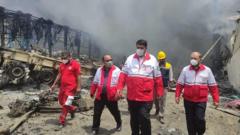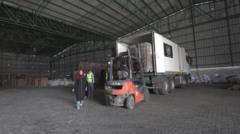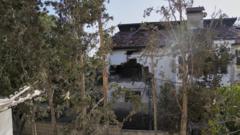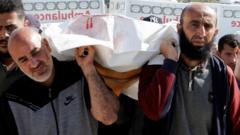The Israeli military conducted a strike in a southern suburb of Beirut on Sunday, targeting the Hezbollah stronghold of Dahiya. This attack, described by Israeli officials as necessary to prevent Hezbollah's missile stockpiling, has sparked outrage from Lebanese leaders, who call it a violation of national sovereignty. As regional tensions rise, calls for international intervention intensify.
Israeli Airstrike Hits Hezbollah Stronghold in Beirut: Tensions Escalate

Israeli Airstrike Hits Hezbollah Stronghold in Beirut: Tensions Escalate
Recent Israeli military action in Lebanon raises concerns over stability in the region.
In a decisive military action on Sunday afternoon, the Israeli military targeted a residential neighborhood in the Dahiya district of Beirut, Lebanon, a known bastion for the militant group Hezbollah. This operation has ignited fears that the fragile cease-fire, which had successfully halted a prolonged conflict between Israel and Hezbollah in November 2024, may now be threatened.
Israeli Prime Minister Benjamin Netanyahu and Defense Minister Israel Katz released a joint statement emphasizing the purpose behind the strike was to dismantle infrastructure used by Hezbollah for storing precision missiles. "Israel will not allow Hezbollah to grow stronger and pose any threat to it—anywhere in Lebanon," they stated, underscoring their commitment to national security.
In response, Lebanese President Joseph Aoun expressed profound concerns over Israel's actions, labeling them as detrimental to regional stability. He urged France and the United States—key players in maintaining the cease-fire—to intervene and pressure Israel to halt what he deemed unacceptable violations of Lebanese sovereignty.
President Aoun remarked that ongoing Israeli assaults jeopardize the security of the region and warned of the escalatory potential arising from such military activities. Hezbollah has yet to issue an official comment regarding the airstrike, leaving many in the region on edge about the implications of this renewed conflict.
Israeli Prime Minister Benjamin Netanyahu and Defense Minister Israel Katz released a joint statement emphasizing the purpose behind the strike was to dismantle infrastructure used by Hezbollah for storing precision missiles. "Israel will not allow Hezbollah to grow stronger and pose any threat to it—anywhere in Lebanon," they stated, underscoring their commitment to national security.
In response, Lebanese President Joseph Aoun expressed profound concerns over Israel's actions, labeling them as detrimental to regional stability. He urged France and the United States—key players in maintaining the cease-fire—to intervene and pressure Israel to halt what he deemed unacceptable violations of Lebanese sovereignty.
President Aoun remarked that ongoing Israeli assaults jeopardize the security of the region and warned of the escalatory potential arising from such military activities. Hezbollah has yet to issue an official comment regarding the airstrike, leaving many in the region on edge about the implications of this renewed conflict.


















